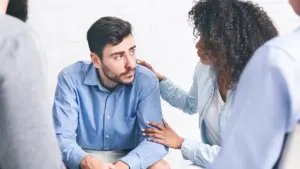If you’re wondering how to combat social anxiety, know that many others are on the same path. Social anxiety can make everyday things feel crushing and hard to handle. But the good news is that there are ways to manage it.
In this blog post, you’ll learn what social anxiety is, what it feels like, and what might cause it. You’ll also discover simple tools and treatments that can help you feel more confident and in control. Whether your anxiety is mild or strong, there’s hope, and you can take the first step today.

What Is Social Anxiety?
You might feel nervous before speaking in front of a crowd or meeting new people – that’s normal. But if you feel very scared or worried about being judged by others, even in everyday situations, you might be dealing with something more than just shyness. This is called social anxiety, also known as social phobia.
There are two types of social anxiety:
1. Generalized Social Anxiety Disorder (SAD)
This is the most common type. About 7 out of every 100 adults in the U.S. may struggle with it each year.1 It shows that SAD is not rare; lots of people struggle with it, even if they don’t always talk about it.
If you have this, you probably feel nervous in almost all social settings, such as meetings, parties, talking to coworkers, or even just saying hi to someone. These feelings usually start in childhood or the teen years, and they often get worse over time if untreated.
2. Performance-Only Social Anxiety
This type is less common. You might feel fine in everyday situations but get anxious when you’re the center of attention, like giving a speech, performing, or reading out loud.
This type usually starts later in life, and it doesn’t always affect daily life as much as generalized social anxiety.
Now, it’s important to know that social anxiety is NOT the same as being shy or introverted.
- If you’re shy, you may feel a little awkward or nervous around people at first, but you can usually warm up with time.
- If you’re introverted, you prefer quiet spaces and spending time alone but are not necessarily afraid of social situations.
Social anxiety is different because it causes deep-seated fear that doesn’t go away easily. It can stop you from doing things you enjoy or need to do, like going to school, working a job, or meeting new people.
Symptoms of Social Anxiety Disorder
Social anxiety doesn’t just affect your thoughts and feelings. It can also cause physical symptoms, such as:
- A fast or pounding heartbeat
- Feeling sweaty, even when it’s not hot
- Blushing or turning red easily
- Trembling or shaking
- Feeling sick to your stomach (nausea)
- Shortness of breath
These symptoms can make it even harder to face social situations. You might feel this way before, during, or even after being around others.
Causes and Risks of Social Anxiety
Social anxiety doesn’t have just one cause. It usually happens because of how your brain works and what you’ve been through in life. It’s a cross between nature (your body and brain) and nurture (your experiences and environment).
What’s Going On Inside Your Body
Your brain and nervous system play a big role in how you handle stress and social situations. If you have social anxiety, a few things might be happening inside:
- Your nervous system reacts too strongly. Even small things, like someone looking at you, can make your body release cortisol, the stress hormone. This makes you feel nervous or panicked.
- You may have lower levels of serotonin. Serotonin is a chemical that helps control your mood. If your brain doesn’t have enough, you might feel more anxious or down.
- Other brain chemicals may be out of balance, too. Glutamate and oxytocin help you feel calm and connected to others. If these are off, social situations can feel more intense and uncomfortable.
- Your brain may be more sensitive to emotions. Some parts of your brain might react more strongly to fear, embarrassment, or stress.
Life Experiences That Play a Role
Things you’ve been through – especially when you were younger – can shape how you feel about social situations:
- Being teased, bullied, or left out as a child can make you more afraid of being judged later in life.
- Growing up with very critical or overprotective parents can make you feel like you’re always being watched or doing something wrong.
- Any type of trauma or neglect in early life can also affect your confidence and how safe you feel around others.
Other Factors That Increase Your Risk
You’re more likely to develop social anxiety if:
- You’re female (though it can affect anyone)
- Someone in your family has it, too
- You were very shy or withdrawn as a child
- You had a strong fear of meeting new people when you were young
Remember, it’s not your fault if you have social anxiety. It’s something that develops over time, and there are ways to manage it and feel better.
Social Anxiety Diagnosis
If you think you might have social anxiety, the first step is to talk to your doctor or a mental health provider. They’ll want to understand what you’re feeling and make sure nothing else is causing your symptoms.
Here’s what might happen during a diagnosis:
- A physical exam – Your doctor may check if a health problem or medicine is making you feel anxious.
- A conversation about your symptoms – They’ll ask what makes you anxious, how often it happens, and how it affects your life.
- A checklist or form – You might go over a list of situations to see which ones cause you fear or stress.
- A short questionnaire – You may fill out some questions to describe your thoughts and feelings.
- DSM-5 criteria – The Diagnostic and Statistical Manual of Mental Disorders (DSM-5) criteria, published by the American Psychiatric Association, is a guide doctors use to help diagnose mental health conditions, including social anxiety.
To be diagnosed with social anxiety disorder, here are the common characteristics that people with social anxiety possess:
- You fear being watched or judged. Even doing small things, like eating or writing in front of others, can make you nervous.
- You avoid social situations. You might skip parties, meetings, or even phone calls because they feel too uncomfortable.
- You overthink before and after events. You may spend a lot of time worrying about what could go wrong or replaying what happened, thinking you did something wrong.
- You have strong physical symptoms. Your heart might race, your hands may shake, or you might feel sick to your stomach when you’re around people.
- You have trouble speaking up. You might find it hard to start conversations, ask questions, or share your thoughts even when you want to.
If this sounds like what you’re going through, know that help is available, and you can feel better with support and the right tools.
Tools and Treatment Options to Manage Social Anxiety
There are treatments and tools available to help you take control of your social anxiety. Some tools are simple ways you can try on your own, while others may involve help from a medical professional. Here are combinations of both:
1. Practice Deep Breathing and Relaxation
When you feel anxious, your heart might race, or your hands might shake. Holistic approaches like deep breathing can help calm your body and your mind.
- Try slowly breathing in through your nose for 4 seconds
- Hold for 4 seconds
- Then breathe out through your mouth for 4 seconds
- Repeat a few times until you feel more relaxed
2. Challenge Negative Thoughts
You might often think, “Everyone is judging me” or “I’m going to mess up.” These thoughts can make anxiety worse. Try to catch those thoughts and ask yourself, “Is this really true?” or “What’s the worst that could happen?”
Changing how you think can help change how you feel.
3. Start Small and Face Your Fears Slowly
You don’t have to jump right into a big party or give a speech. Start small. Maybe say hello to someone, ask a question in class, or go to a small group. Little steps can build your confidence over time.
4. Cognitive Behavioral Therapy (CBT)
This is a type of talk therapy that’s very helpful for social anxiety. A therapist can help you understand your thoughts and learn better ways to handle social situations. CBT is one of the most effective treatments for SAD.
5. Medication (if needed)
Sometimes, your doctor might suggest medicine to help with the anxiety. These can include:
- Selective Serotonin Reuptake Inhibitors (SSRIs) – These are often the first type of medication doctors try for anxiety and depression. They help balance chemicals in your brain that affect mood. Examples: paroxetine (Paxil), sertraline (Zoloft)
- Serotonin-Norepinephrine Reuptake Inhibitors (SNRIs) – Similar to SSRIs, these help with mood and anxiety by working on more brain chemicals. Example: venlafaxine (Effexor)
- Beta Blockers – These are usually heart medications, but they can help with physical anxiety symptoms like a fast heartbeat or shaking. People sometimes take them before public speaking or performances. Example: propranolol (common beta blocker used for performance anxiety)
- Anti-anxiety medications (Benzodiazepines) – These work quickly and help you feel calm, but they’re usually for short-term use only, as they can be habit-forming. They’re sometimes taken before a stressful event. Examples: clonazepam (Klonopin), lorazepam (Ativan)
Medication is usually used along with therapy or other tools, not by itself.
6. Join a Support Group
Talking with others who feel the same way can be comforting. Support groups (in person or online) let you share your story and hear from people who truly understand.
7. Healthy Habits Make a Difference
Taking care of your body helps your mind, too. Try to:
- Get enough sleep
- Eat healthy meals
- Exercise regularly
- Limit caffeine and alcohol
These small changes can lower stress and help you feel more in control.
Everyone’s journey is different. Try what works best for you.
When to Consider Professional Help
Sometimes, social anxiety can feel so strong that it gets in the way of your daily life. It might be time to reach out for help. Getting professional help is a smart and strong step toward feeling better.
At South Coast Counseling, we’re here to support you. Our team can help you understand what’s going on, offer proven treatments, and guide you through the steps on how to combat social anxiety. Reach out today – we’re ready to walk with you.

Sources:
National Institute of Mental Health. (2025). NIMH: Social Anxiety Disorder. Www.nimh.nih.gov. https://www.nimh.nih.gov/health/statistics/social-anxiety-disorder







